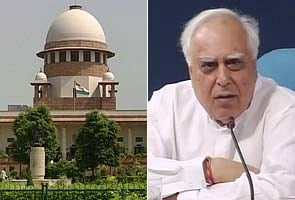
New Delhi:
The Supreme Court today refused to accept a petition against Kapil Sibal that accuses the Telecom Minister of bending the rules to favour Anil Ambani and his Reliance Communications (RCom). The court did not comment on the merits of the allegations - it has for now only said that they cannot be linked to the 2G telecom scam that is being investigated by the CBI and monitored by the Supreme Court.
A Public Interest Litigation or PIL filed by advocate Prashant Bhushan alleged that Mr Sibal arbitrarily downsized the penalty imposed upon Mr Ambani for violating the terms of a contract. The controversy lies not just in the allegations against Mr Sibal, but in his decision to use a private lawyer - Rohinton Nariman - to defend himself. That move prompted Solicitor General Gopal Subaramaniam to resign.
Mr Bhushan had sought to make this PIL a part of the larger case on the 2G telecom scam which has caused a political earthquake in India, causing the resignation of two telecom ministers, one of who is now in jail, and the arrests of some of India's senior-most executives in the telecom sector. The investigation is based on another PIL filed by Mr Bhushan.
The court today said, "If there is an illegal action then whosoever has a locus can challenge it. This can't be linked. We are only concerned that the CBI's investigation is in the right course. Whether decision of a minister is right or wrong, it can be a separate issue."
Mr Bhushan last week alleged that instead of penalizing Mr Ambani Rs. 650 crore for a contract allegedly violated by him, Mr Sibal has asked for Rs. 5 crore. Mr Sibal said the PIL was being used to "settle personal scores" and argued it could not be linked to the 2G scam, a decision which the Supreme Court has agreed with.
In May 2007, Anil Ambani's Reliance Communications (RCom) signed on to provide rural telephony. Companies are entitled to seek a subsidy from the Universal Service Obligation Fund (USOF) for operating in rural sectors. Mr Sibal said that Reliance did not seek this subsidy. The government is obliged to select the operator that asks for the least subsidy. Mr Ambani therefore won the rights.
Three years later, in November 2010, RCom allegedly decided to stop the service in 13 circles. The USOF objected and sent Reliance a showcause notice, suggesting a penalty of Rs. 50 crore. By the time the file was sent to Mr Sibal, he says, the services had been restored. So Mr Sibal says he studied the contract between Reliance and USOF. He agreed that he over-ruled his bureaucrats. A clause in the agreement provided for a penalty for "interruption of services" and Mr Sibal ordered that the penalty be based on this clause - which, according to the minister, works out to Rs. 5 crore, and is based on the math stipulated in the contract.
A Public Interest Litigation or PIL filed by advocate Prashant Bhushan alleged that Mr Sibal arbitrarily downsized the penalty imposed upon Mr Ambani for violating the terms of a contract. The controversy lies not just in the allegations against Mr Sibal, but in his decision to use a private lawyer - Rohinton Nariman - to defend himself. That move prompted Solicitor General Gopal Subaramaniam to resign.
Mr Bhushan had sought to make this PIL a part of the larger case on the 2G telecom scam which has caused a political earthquake in India, causing the resignation of two telecom ministers, one of who is now in jail, and the arrests of some of India's senior-most executives in the telecom sector. The investigation is based on another PIL filed by Mr Bhushan.
The court today said, "If there is an illegal action then whosoever has a locus can challenge it. This can't be linked. We are only concerned that the CBI's investigation is in the right course. Whether decision of a minister is right or wrong, it can be a separate issue."
Mr Bhushan last week alleged that instead of penalizing Mr Ambani Rs. 650 crore for a contract allegedly violated by him, Mr Sibal has asked for Rs. 5 crore. Mr Sibal said the PIL was being used to "settle personal scores" and argued it could not be linked to the 2G scam, a decision which the Supreme Court has agreed with.
In May 2007, Anil Ambani's Reliance Communications (RCom) signed on to provide rural telephony. Companies are entitled to seek a subsidy from the Universal Service Obligation Fund (USOF) for operating in rural sectors. Mr Sibal said that Reliance did not seek this subsidy. The government is obliged to select the operator that asks for the least subsidy. Mr Ambani therefore won the rights.
Three years later, in November 2010, RCom allegedly decided to stop the service in 13 circles. The USOF objected and sent Reliance a showcause notice, suggesting a penalty of Rs. 50 crore. By the time the file was sent to Mr Sibal, he says, the services had been restored. So Mr Sibal says he studied the contract between Reliance and USOF. He agreed that he over-ruled his bureaucrats. A clause in the agreement provided for a penalty for "interruption of services" and Mr Sibal ordered that the penalty be based on this clause - which, according to the minister, works out to Rs. 5 crore, and is based on the math stipulated in the contract.
Track Latest News Live on NDTV.com and get news updates from India and around the world

